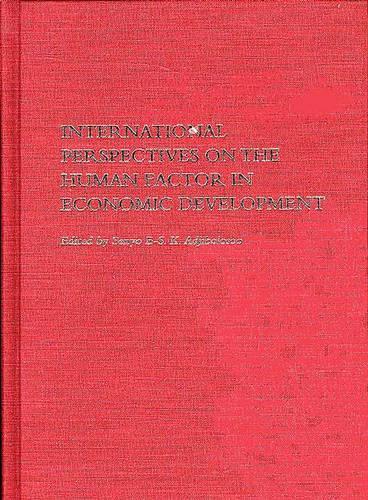
International Perspectives on the Human Factor in Economic Development
(Hardback)
Publishing Details
International Perspectives on the Human Factor in Economic Development
By (Author) Senyo B-S. K. Adjibolosoo
Bloomsbury Publishing PLC
Praeger Publishers Inc
19th March 1998
United States
Classifications
Tertiary Education
Non Fiction
Development economics and emerging economies
338.9
Physical Properties
Hardback
248
Description
Focusing on the development agenda of selected developed and developing countries, the contributors in this volume show that the varying degrees of success or failure in the programs of different countries are due to the way they deal with human factor development. Each essay clearly shows that a nation cannot achieve development if it continuously fails to develop its own national human factor. The contributors maintain that what different parts of the world, particularly Southeast Asia, call a development miracle is not a miracle at all. Countries such as Japan and Singapore have experienced significant development in recent decades because their programs have focused intently on building the human factor. Countries such as Mexico, Nigeria, Bolivia, and India, on the other hand, are struggling to develop because their ongoing development programs do not address the human factor. Nations that aspire to achieve sustained human-centered development in the 21st century should focus on human factor development now.
Reviews
"This book adds a significant new dimension to the growing body of human factor (HF) literature....The book is very readable and I highly recommend it for researchers, educators, students (upper undergraduate, and graduate), and policy makers in government, agencies (NGO, Bilateral, and Multilateral), and corporations. It adds significant insight on the importance of the HF in economic development and in healthy functioning of society."-Harold J. Harder Faculty of Business and Economics Trinity Western University
.,."adds a significant new dimension to the HF literature by drawing examples from eleven countries....We are given four insightful studies of success in developed countries and seven of success or problems in less developed countries....The book offers a variety of insights into factors that enhance or hinder development of people."-Canadian Journal of Development Studies
...adds a significant new dimension to the HF literature by drawing examples from eleven countries....We are given four insightful studies of success in developed countries and seven of success or problems in less developed countries....The book offers a variety of insights into factors that enhance or hinder development of people.-Canadian Journal of Development Studies
In this book Adjibolosoo leads twelve other contributors in a spirited challenge of orthodox explanations of underdevelopment....This book represents an important step in the evolution toward that "better" theory. It makes a strong and persuasive case for the role of Human Factor in economic development.-Journal of Third World Studies
"In this book Adjibolosoo leads twelve other contributors in a spirited challenge of orthodox explanations of underdevelopment....This book represents an important step in the evolution toward that "better" theory. It makes a strong and persuasive case for the role of Human Factor in economic development."-Journal of Third World Studies
..."adds a significant new dimension to the HF literature by drawing examples from eleven countries....We are given four insightful studies of success in developed countries and seven of success or problems in less developed countries....The book offers a variety of insights into factors that enhance or hinder development of people."-Canadian Journal of Development Studies
Author Bio
SENYO B-S. K. ADJIBOLOSOO is Professor of Business and Economics at Trinity Western University in Canada. He has published several articles in econometrics and economic development and is the author of several books, including most recently Human Factor Engineering and the Political Economy of African Development (Greenwood, 1996).
